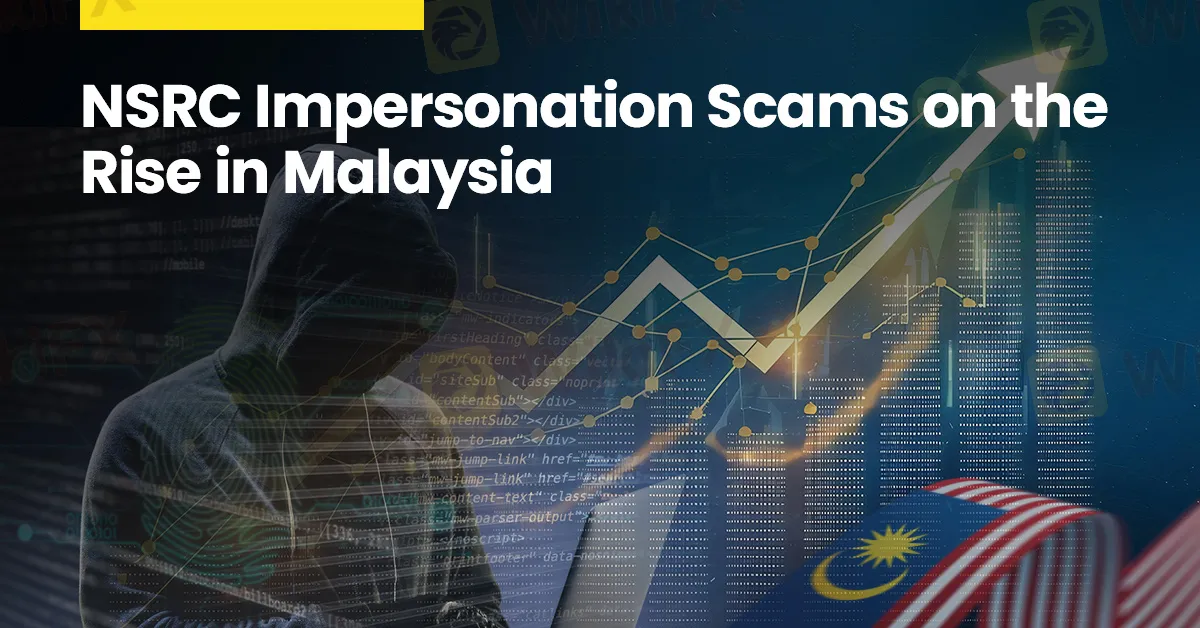简体中文
繁體中文
English
Pусский
日本語
ภาษาไทย
Tiếng Việt
Bahasa Indonesia
Español
हिन्दी
Filippiiniläinen
Français
Deutsch
Português
Türkçe
한국어
العربية
NSRC Impersonation Scams on the Rise in Malaysia
Abstract:The article underscores the imperative for public vigilance against impersonation scams targeting bank customers, emphasizing the heightened risk posed by fraudulent calls from individuals masquerading as National Scam Response Centre officers.

Amidst a surge in scams impersonating National Scam Response Centre (NSRC) officers, the public receives a stern caution from the Association of Banks in Malaysia (ABM) and the Association of Islamic Banking and Financial Institutions Malaysia (AIBIM). These scams, if successful, could lead to significant financial losses for unsuspecting victims.
Typically, the scam begins with victims receiving calls from individuals claiming to be NSRC officers. These callers allege that the victims' identities, including their National Registration Identity Card (NRIC) numbers or mobile numbers, are linked to illegal activities such as money laundering and transactions involving mule accounts.
The fraudulent tactics deployed by these impostors are sophisticated, involving prolonged interrogation techniques that mimic authentic investigations. Through persistent and repeated phone calls, they gain the victims' trust and persuade them to leave their debit/ATM cards at specified locations.

This manoeuvre grants the fraudsters access to victims' online banking accounts, enabling them to execute unauthorized transfers, initiate bill payments, register for online banking services, and even withdraw cash using the victims' cards.
The NSRC operational procedures are clarified in the statement, emphasizing that the centre only receives calls from the public and does not engage in outbound calls to individuals. It advises immediate disconnection if individuals receive calls from alleged NSRC officers.
Furthermore, the public is cautioned to exercise vigilance against fraudsters impersonating representatives from enforcement agencies and regulatory bodies such as Bank Negara Malaysia and the Royal Malaysian Police. These impostors often resort to intimidation and coercion over the phone to extract sensitive information or persuade victims to transfer money.
The statement reiterates that banks will never request sensitive information such as credit/debit card numbers, CVV numbers, online banking credentials, or SMS OTP/TAC numbers from customers.
In a bid to enhance security measures, banks have implemented various initiatives since July 2023. These include substituting SMS OTP with more secure authentication methods, enhancing fraud detection mechanisms, introducing a cooling-off period for new online banking registrations, restricting secure device registrations to one per customer, and establishing a 24/7 complaint channel.
In addition to these measures, the public is advised to adopt good cyber hygiene practices, such as refraining from clicking on links from unfamiliar sources, downloading applications exclusively from official app stores, and abstaining from sharing banking details or engaging with unknown calls or messages. These precautions are essential to safeguard against financial scams and ensure the security of personal information in today's digital landscape.

Disclaimer:
The views in this article only represent the author's personal views, and do not constitute investment advice on this platform. This platform does not guarantee the accuracy, completeness and timeliness of the information in the article, and will not be liable for any loss caused by the use of or reliance on the information in the article.
Read more

Forex Brokers vs. Crypto Exchanges: Which Is Safer for Traders?
The world of trading offers two major platforms: forex brokers and cryptocurrency exchanges. Both provide opportunities, but they also come with risks. Traders often wonder which is the safer option. While some lean towards traditional forex brokers, others trust the decentralised nature of crypto exchanges. Let us know if you are #TeamForex or #TeamCrypto!

The Yuan’s Struggle: How China Plans to Protect Its Economy
China introduced new measures on Monday to support its weakening currency, the yuan, amidst mounting economic and political pressures. The government announced plans to boost foreign exchange reserves in Hong Kong and ease borrowing restrictions for companies to improve capital flows.

XTB Secures UAE and Indonesia Licenses, Expands in 2025
XTB accelerates global growth in 2025 by securing key licenses in the UAE and Indonesia, paving the way for broader services and innovative offerings worldwide.

Forex Market Outlook 2025: Institutional Predictions and Trend Analysis
In 2025, the global forex market faces a range of complex macroeconomic and geopolitical challenges. From shifts in U.S. monetary policy to structural issues in Europe’s economy and potential volatility in emerging markets, financial institutions worldwide are offering forecasts for the year ahead. This article compiles insights from leading organizations to explore potential trends and opportunities in the forex industry for 2025.
WikiFX Broker
Latest News
Wolf Capital Exposed: The $9.4M Crypto Ponzi Scheme that Lured Thousands with False Promises
Confirmed! US December non-farm payroll exceeded expectations
Spain plans 100% tax for homes bought by non-EU residents
90 Days, Rs.1800 Cr. Saved! MHA Reveals
LiteForex Celebrates Its 20th Anniversary with a $1,000,000 Challenge
The Yuan’s Struggle: How China Plans to Protect Its Economy
400 Foreign Nationals Arrested in Crypto Scam Raid in Manila
Singapore Blocks Polymarket Access, Following U.S. and France
OneZero Collaborates with Ladies Professional Golf Association (LPGA)
Housewives Scammed of Over RM1 Million in Gold Investment Fraud
Currency Calculator






